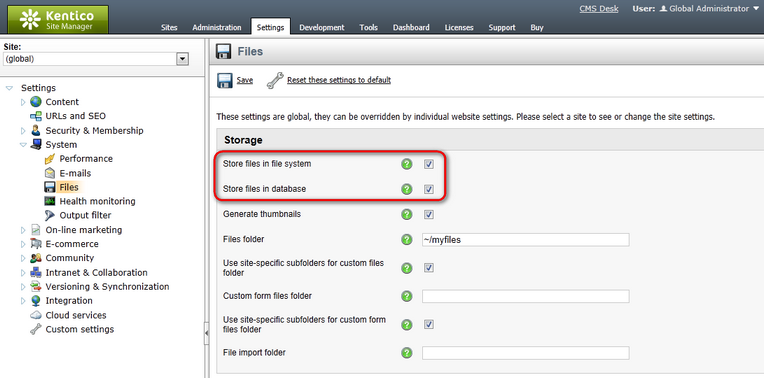Where the files are stored |

|

|

|

|
|
Where the files are stored |

|

|

|

|
|
|
||
Document attachments and CMS.File documents can be physically stored in the file system, in the database, or in both. You can define this in Site Manager -> Settings -> System -> Files, using the Store files in file system and Store files in database options.

The following three combinations can be achieved using the settings:
•File system - the files are stored in the configured folder on your disk. This option provides the best performance. However, the Modify permissions on the disk must be granted to the ASP.NET account on your machine, which is not always possible. The process of granting the Modify permission is described in this chapter.
•Database - the files are stored in the database. This option provides worse performance, but it allows you to use full-text search in uploaded files. It also doesn't require the Modify permission on the disk and it allows you to easily backup the uploaded files as a part of your database backup.
•Both - Database and file system - this option combines the advantages of both options. It provides the same performance as the file system-only option since the files are stored in the file system. At the same time, you can use the full-text search because the database is also available.
Document attachments are stored in the file system under ~/<site code name>/files, metafiles are stored under ~/<site code name>/metafiles. Both of these folders can be located in a different location, which can be configured using the Site Manager -> Settings -> System -> Files -> Custom files folder settings option. Lear more in File-related settings.
Files uploaded by site users into forms are always stored in the file system. The default location is ~/<site code name>/BizFormFiles. You can customize the location in Site Manager -> Settings -> System -> Files -> Form files folder.
Files stored in media libraries are always stored in the file system. The default location is ~/<site code name>/media, while the location of the folder can be customized in Site Manager -> Settings -> Content -> Media -> Custom media libraries folder, as described in Modules -> Media libraries -> Media libraries settings.